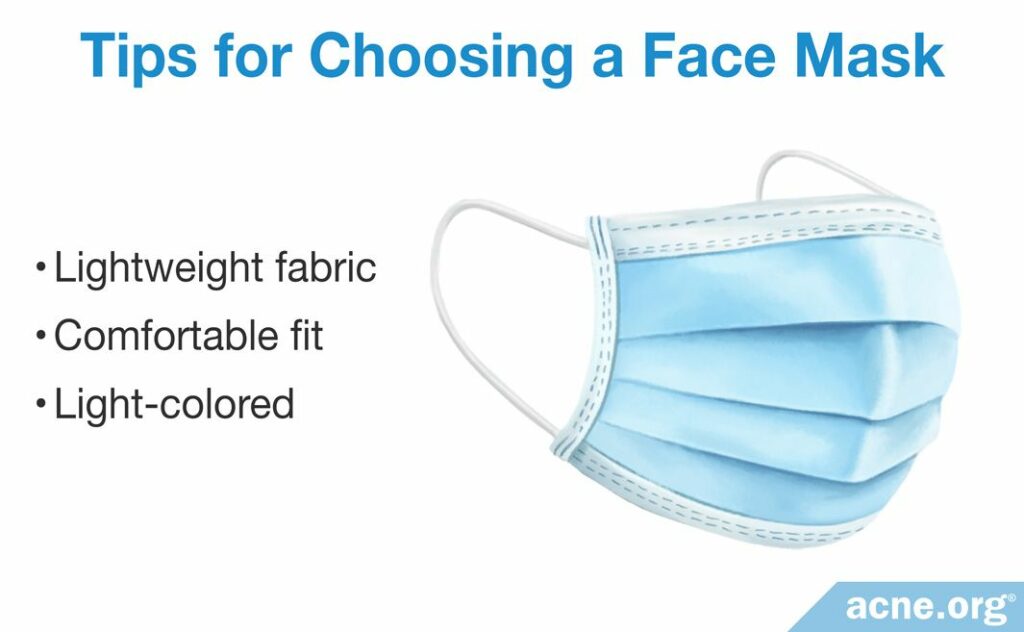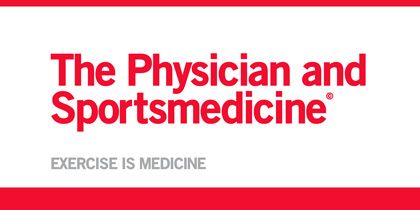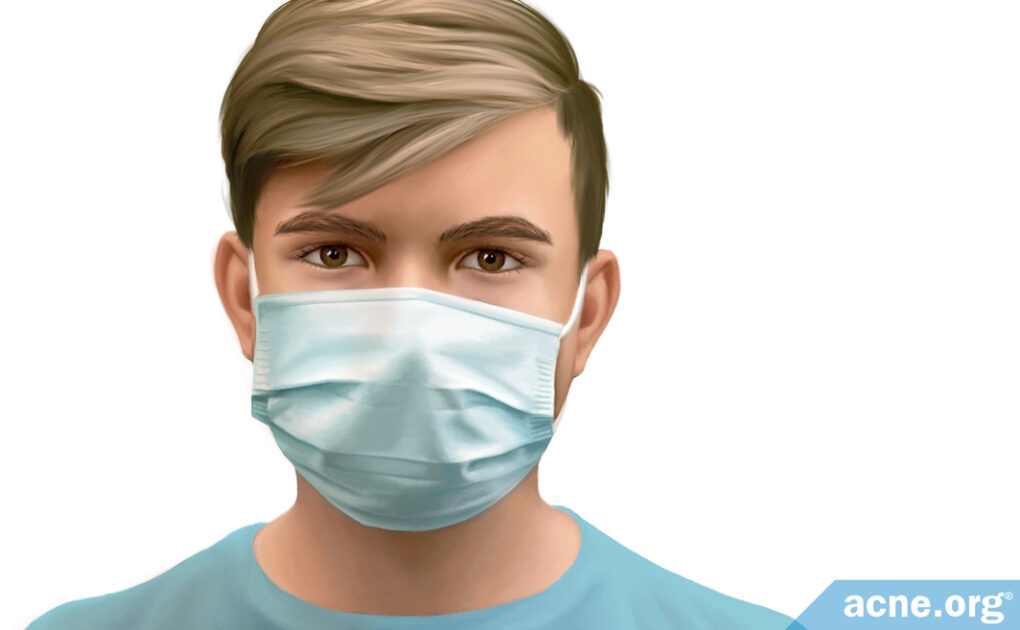Yes. Choose a Lightweight, Soft Mask That Won’t Rub Against Your Skin, Ideally in a Light Color to Limit Sweating.

The Essential Info
Wearing a face mask can be essential for limiting the spread of respiratory infections like COVID-19.
However, regularly wearing a mask can worsen existing acne or even trigger a breakout in someone who doesn’t normally have acne.
How a Mask Can Lead to Acne: A mask can trigger or worsen acne in two ways:
- Rubbing or chafing the skin: A mask that repeatedly rubs against the chin, cheeks, or neck can cause physical irritation of the skin in those areas. Physical irritation of the skin is well known to cause acne flare-ups.
- Increasing sweating: Wearing a thick or dark-colored mask can cause your face to sweat, especially in the summer months. Sweat makes physical irritation of the skin worse, so if your mask is already rubbing against your skin, sweat may compound the problem. Note: Sweat by itself does not cause acne.
What to Do about It: To reduce the chance of acne flare-ups, choose a soft, lightweight mask that won’t chafe your skin. If you can, test out a few styles to find one with soft edges and straps that won’t dig into your skin. Try to select a light-colored mask that will reflect sunlight, helping you stay cool and keeping sweat to a minimum.
My Choice: A simple 3-layer surgical mask is my personal choice–the light blue ones that are disposable. One study found that this type of mask is least likely to cause itching, which suggests it is less irritating to the skin than other types of masks, and I’ve found this to be true myself. I bought a box of 50 of them and it’s lasting me forever.

The Science
- Tips for Choosing a Face Mask for Acne-prone Skin
- Evidence That Wearing a Face Mask Can Physically Irritate Your Skin
- Evidence That Sweating under a Face Mask Can Worsen Physical Irritation of the Skin
- The Bottom Line
In the time of COVID-19, preventing infection means wearing a face mask whenever you visit a public place or interact with strangers at close quarters. However, face masks can lead to more acne. Here’s how:
- Rubbing against or pressing on the skin: A convincing body of research shows that anything that physically irritates the skin can potentially lead to acne. This is especially true for anything scratchy or constricting that you wear on a regular basis, because it will tend to irritate the same area of skin over and over. In other words, frequently wearing a face mask can predispose you to acne on the face. This is so common that even people who don’t usually break out are noticing lately that they are experiencing “mystery” zits around the mouth, cheeks, and chin.
- Increasing sweating: Research shows that sweating can worsen physical irritation of the skin, so if your mask is chafing your skin and also making you sweat, it’s a double whammy. While some sweating under your mask is unavoidable in the summer, it’s best to keep it to a minimum. Note: Sweat on its own isn’t a problem for acne-prone skin but can become an issue when combined with skin irritation.
Tips for Choosing a Face Mask for Acne-prone Skin

To reduce the risk of breakouts, look for a mask that:
- Is lightweight: A lightweight mask will reduce pressure and rubbing against your skin.
- Fits comfortably: A comfortable mask that doesn’t dig into your chin or cheeks will limit physical irritation.
- Is light-colored: A light-colored mask will reflect sunlight and limit sweating.
Many different face masks can fit these criteria. The best choice for many people may be a simple disposable surgical mask because it is lightweight and light-colored, and it will keep you protected.
However, due to supply shortages, it is not always possible to find this type of mask, or you may be concerned about the environmental cost of wearing disposable masks. The Centers for Disease Control and Prevention (CDC) guidelines state that a cloth face mask can also offer good protection.1 If you choose to buy or make a cloth mask, look for soft, light-colored cotton and straps that won’t dig into your skin. If possible, try the mask on before committing.
Let’s take a closer look at the evidence showing that the wrong face mask can trigger or worsen acne by physically irritating the skin and making you sweat. We’ll tackle the evidence on physical irritation first.
Evidence That Wearing a Face Mask Can Physically Irritate Your Skin
A large body of research shows that any type of pressure or rubbing against the skin can cause physical irritation, which in turn can trigger an acne breakout. The first researchers who recognized this issue wrote about it in the journal Archives of Dermatology in 1975:

“In this report we wish to emphasize another extrinsic factor that clearly intensifies acne, namely [physical] forces. Among these are pressure, tension, friction, stretching, rubbing, pinching, or pulling.”2
While no studies have as yet looked at physical irritation of the skin caused specifically by face masks, one brand-new study examined facial itching due to face masks.3 Since itching can indicate skin irritation, this study helps us zero in on which types of face masks are most likely to irritate the skin and potentially worsen acne.
Study on facial itching caused by wearing a face mask: An indicator of skin irritation
In this study, researchers surveyed 2,315 people who wore face masks due to the COVID-19 pandemic. The scientists found that nearly 20% of those who wore masks experienced mild-to-moderate facial itching. People who were acne-prone were more likely to report itching.
Since itch is a sign of skin irritation, this study indirectly tells us that about 20% of people experience at least mild skin irritation from wearing a face mask. In addition, if you are acne-prone, your skin may be more likely to be irritated by a mask.
The participants in this study wore a variety of masks, including:
- 3-layer disposable surgical masks
- Cloth masks
- Disposable respirators (e.g. N95, FFP)
- Half-face elastomeric respirators (gas masks)
- Full-face respirators (gas masks)
Of these mask types, the researchers found that:
- Surgical masks were less likely to cause itching than other types of masks.
- Cloth masks were more likely to cause itching than other types of masks.
- Half- or full-face respirators were worn by very few participants, so there may simply not be enough data yet to know how irritating they are to the skin. However, common sense suggests that these types of masks would score high on the irritation scale. The masks themselves are heavy and likely to cause pressure on the face, and the strong elastics will tend to dig into the skin, further increasing the chance of irritation.
The researchers were concerned to find that some of the participants who experienced itching went on to either scratch their faces with the mask on or to take the mask off and scratch their faces. Aside from potentially increasing the spread of respiratory viruses, scratching is a bad idea because it further irritates the skin. Therefore, the problem with wearing an itchy mask is two-fold:
- Direct skin irritation from the mask: The mask itself can irritate the skin.
- Further skin irritation from scratching the itchy skin: Wearing the irritating mask can compel the person to scratch the itch, which will further irritate the skin.
This finding highlights the importance of choosing a less irritating mask at the outset.
Expand to read details of study

This study was published in the journal Acta Dermato-Venereologica in 2020.3 The researchers conducted an internet survey of 2,315 students in Poland between the ages of 18 and 27. Out of these participants, 1,393 reported that they had worn a mask during the previous week.
The scientists found that 19.6% of the students who wore masks experienced facial itching. Of those who reported itching, 64.5% experienced moderate itching and 23.4% experienced mild itching. Only 12.1% of those who experienced itching described it as severe or very severe.
The researchers wrote, “Regarding itch reported as a bothersome symptom…wearing surgical masks among the other types of masks showed significantly lower risk of development of itch…In contrast, use of cloth masks was related to higher risk of occurrence of bothersome itch.”3
The findings from this study suggest that a simple 3-layer surgical mask may be the best choice for limiting itching and therefore skin irritation. However, we should note that this is only one study, and it relies on information gathered through an online survey, which is an unreliable method of obtaining data.
Apart from this single study on face masks and itching, we can draw on studies that have looked at skin irritation in people wearing other types of protective equipment on or near their faces, like chin straps and athletic helmets.
Studies on skin irritation from wearing other protective equipment
Research shows that regularly wearing sports equipment that touches the face, such as football helmets, head and face guards, and sweat-absorbing headbands, can create skin irritation and cause breakouts.2,4 In addition, one study reported on three patients who developed acne around the mouth from wearing a medical brace to correct a jaw deformity.5
Expand to read details of research on skin irritation from athletic or medical equipment

The original 1975 study that first identified physical irritation as a trigger of acne described a variety of acne cases from wearing athletic equipment. The researchers listed the following physical irritants that had caused acne in some patients:
- Chin straps
- Football helmets
- Head- and face-guards used in hockey and wrestling
- Motorcycle face- and head-protectors
- Athletic headbands
- Hard or soft hats like those worn in baseball2

A review article published in The Physician and Sportsmedicine in 2004 described acne breakouts in football players in areas where football equipment rubs against the skin, such as the chin and shoulders. This condition is so common that it has earned the nickname “football acne.” The authors of the article note that even players who have no previous history of acne can still develop football acne during game season.4

A case report published in the British Medical Journal in 1976 described three young women between the ages of 17 and 24 who developed mild acne around the mouth after wearing a corrective splint to fix a jaw deformity. The acne appeared after 3-6 weeks of wearing the splints. The researchers noted that the young women had “minimal or no acne” anywhere else on the body.5
Evidence That Sweating under a Face Mask Can Worsen Physical Irritation of the Skin
As we have seen, wearing a face mask that rubs against or presses down on the skin can cause physical irritation, which can lead to acne. Sweating may make this type of physical irritation worse. In other words, if your mask not only chafes your skin, but also makes you sweat, this may further increase the chances of a breakout.
For example, one case report found that sweating can worsen physical irritation of the skin in patients who are on bedrest.5
Expand to read details of case report

The case report, published in the British Medical Journal in 1976, described nine male patients between the ages of 18 and 39 who developed acne on their backs after a long period of bedrest while awaiting surgery. The scientists believed that the combination of sweating and pressure on the skin from the bed caused the acne. The researchers wrote, “Undoubtedly all patients who developed acne on the back, complained of excessive sweating at that site.”5
One review article proposes that sweat makes physical irritation worse by causing swelling of a protein called keratin, which is found in the skin in large amounts. When this protein swells up, it causes skin pores to narrow, which makes them more likely to clog.6
The Bottom Line
While wearing a face mask can help keep you and others from becoming infected with diseases like COVID-19, the wrong mask can trigger an acne breakout or intensify existing acne. Look for a lightweight, light-colored mask that keeps chafing and sweating to a minimum.
References
- Centers for Disease Control and Prevention. Considerations for wearing cloth face coverings. (2020). https://www.cdc.gov/coronavirus/2019-ncov/prevent-getting-sick/cloth-face-cover-guidance.html
- Mills, O. H. & Kligman, O. Acne mechanica. Archives of Dermatology 111, 481-483 (1975). https://pubmed.ncbi.nlm.nih.gov/123732/
- Szepietowski, J.C., Matusiak, Ł., Szepietowska, M., Krajewski, P.K. & Białynicki-Birula, R. Face mask-induced Itch: A self-questionnaire study of 2,315 responders during the COVID-19 pandemic. Acta Dermato-Venereologica 100, adv00152 (2020). https://www.unboundmedicine.com/medline/citation/32449781/Face_Mask_induced_Itch:_A_Self_questionnaire_Study_of_2315_Responders_During_the_COVID_19_Pandemic_
- Basler, R. et al. Athletic skin injuries. The Physician and Sportsmedicine 32, 33-40 (2004). https://www.tandfonline.com/doi/abs/10.3810/psm.2004.05.304
- Tan, S. G., Cunliffe, W. J. & MacGregor, A. J. Acne mechanica. British Medical Journal 1, 130 (1976). https://www.bmj.com/content/bmj/1/6002/130.1.full.pdf
- Dreno, B., Bettoli, V., Perez, M., Bouloc, A. & Ochsendorf, F. Cutaneous lesions caused by mechanical injury. European Journal of Dermatology 25, 114-121 (2015). https://link.springer.com/article/10.1684/ejd.2014.2502
 Acne.org Products
Acne.org Products